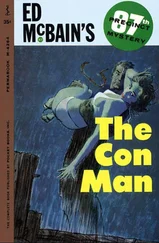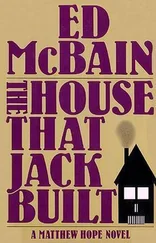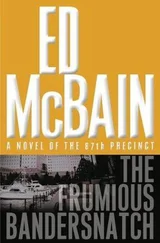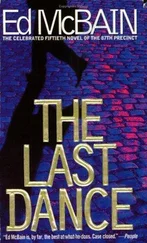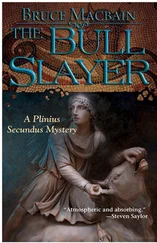Ed Mcbain - The Heckler
Здесь есть возможность читать онлайн «Ed Mcbain - The Heckler» весь текст электронной книги совершенно бесплатно (целиком полную версию без сокращений). В некоторых случаях можно слушать аудио, скачать через торрент в формате fb2 и присутствует краткое содержание. Жанр: Полицейский детектив, на английском языке. Описание произведения, (предисловие) а так же отзывы посетителей доступны на портале библиотеки ЛибКат.
- Название:The Heckler
- Автор:
- Жанр:
- Год:неизвестен
- ISBN:нет данных
- Рейтинг книги:4 / 5. Голосов: 1
-
Избранное:Добавить в избранное
- Отзывы:
-
Ваша оценка:
- 80
- 1
- 2
- 3
- 4
- 5
The Heckler: краткое содержание, описание и аннотация
Предлагаем к чтению аннотацию, описание, краткое содержание или предисловие (зависит от того, что написал сам автор книги «The Heckler»). Если вы не нашли необходимую информацию о книге — напишите в комментариях, мы постараемся отыскать её.
The Heckler — читать онлайн бесплатно полную книгу (весь текст) целиком
Ниже представлен текст книги, разбитый по страницам. Система сохранения места последней прочитанной страницы, позволяет с удобством читать онлайн бесплатно книгу «The Heckler», без необходимости каждый раз заново искать на чём Вы остановились. Поставьте закладку, и сможете в любой момент перейти на страницу, на которой закончили чтение.
Интервал:
Закладка:
He could not have known, not at this stage of the game, that his second qualification was his age. Pop was sixty-three years old, and that was just young enough, just old enough; that was perfect.
“This is seven-card stud,” Rafe told him. “Deuces wild.”
“I don’t like these bastardized versions of poker,” the deaf man said. “They throw off the percentages.”
“Good,” Chuck said. “Maybe we’ll stand a chance of winning. You play poker as if you’re out to slit your mother’s throat.”
“I play poker as if I’m out to win,” the deaf man said. “Isn’t that the right way to play?”
Rafe began laughing again, his blue eyes misting behind their gold-rimmed eyeglasses. He dealt the cards, said, “King bets,” and put the deck down on the table.
“Twenty-five,” the old man said hesitantly.
“Call,” Chuck said.
“I’ll see you,” Rafe said.
The deaf man studied his cards. He was holding a six in the hole, together with a jack. His exposed card was a five. He glanced around the table quickly, and just as quickly pulled his cards together.
“I fold,” he said.
He sat just a moment longer and then rose suddenly, a tall good-looking man in his late thirties who moved with the economy and grace of a natural athlete. His hair was blond and cut close to his skull. His eyes were a dark blue. They flicked now to the street outside, through the plate-glass window of the store front and the inverted legend:

The street side of the store was quiet. An old woman struggled past with a full shopping bag and then moved out of sight. Behind the store, at the back of it, all was chaos. Bulldozers, steam shovels, construction crews swarmed over the vast leveled lot.
“You’d better make this the last hand,” the deaf man said. “We’ve got lots of work to do.”
Rafe nodded. Chuck raised the pot, and the old man dropped out.
“Want to come with me a minute?” the deaf man asked him.
“Sure,” he said.
He pushed back his chair and followed the deaf man to the door leading down to the cellar. The cellar was cool and moist. The smell of fresh earth clung to the walls. The deaf man walked to a long table and opened a box there. He pulled out a gray garment and said, “You’ll be wearing this tonight, Pop. While we work. Want to try it on?”
Pop took the garment and fingered it as if he were making a purchase in a men’s clothing store. His fingers stopped suddenly, and his eyes widened.
“I can’t wear that,” he said.
“Why not?” the deaf man asked.
“I won’t put it on. Not me.”
“Why not?”
“There’s blood on it,” Pop said.
For a moment, for a brief moment in the still, earth-smelling coolness of the basement, it seemed as if the deaf man would lose his temper, as if he would flare into sudden undisciplined anger at the old man’s rebellion. And then he smiled suddenly, radiantly.
“All right,” he said. “I’ll get a new one for you.”
He took the gray garment from the old man and put it back into the box.
4.
A PICTURE OF THEunidentified dead man ran in three of the afternoon tabloids on Thursday, April 9. The papers hit the stands at about twelve noon, one of them carrying it on the front page, the others relegating it to page four, but all of them running the shrieking headline DO YOU KNOW THIS MAN ? The man in the photo seemed to have his eyes closed, and a police artist had sketched a pair of swimming trunks over his exposed genitalia. If anything, the black shoes and white socks looked even more ludicrous now that they were accompanied by the trunks.
“DO YOU KNOW THIS MAN?” the reader read and then looked at this picture of an old duffer who’d undoubtedly been snapped sleeping at a public beach, one of those fellows whose soles are tender and who wears shoes while traversing the sand, some sort of publicity stunt probably, and then the reader saw the copy under the picture, and the copy under the picture informed one and all that this old duffer was not asleep, that he was deader than a mackerel and that the smear on his chest was not a printer’s smudge but a bona fide shotgun wound which has been carelessly left there by a man with urticaria of the trigger finger.
The papers hit the stands at about twelve noon.
At twelve-fifteen, Cliff Savage showed up in the muster room of the 87th Precinct. Spotlessly dressed, a tan Panama shoved onto the back of his head, a white handkerchief peeking from the breast pocket of a brown Dupioni silk suit, Savage sauntered up to the desk and said, “My name’s Savage. I’m a reporter.” He threw the picture of the unidentified dead man onto the desk. “Who’s handling this case?”
Sergeant Dave Murchison looked at the photo, grunted, looked at Savage, grunted again, and then said, “What did you say your name was?”
“Cliff Savage.”
“And what newspaper are you from?”
Savage sighed and pulled a press card from his wallet. He put the card into the desk top, alongside the newspaper photo of the dead man. Murchison looked at it, grunted, and said, “Steve Carella’s on the case. How come your name sounds familiar, Mac?”
“Beats me,” Savage said. “I’d like to see Carella. He in?”
“I’ll check.”
“Don’t bother. I’ll just go straight up,” Savage said.
“The hell you will, mister. You just hold your horses. That press card don’t give you the run of the station house.” Murchison picked up one of the wires protruding from the switchboard and plugged it in. He waited a moment, and then said, “Steve, this is Dave downstairs. A guy named Cliff Savage is here, says he’s a reporter, wants to—What? Okay.” Murchison pulled out the wire. “Says you should go drop dead, Mr. Savage.”
“He said that?”
“Word for word.”
“What the hell kind of an attitude is that?” Savage wanted to know.
“I gather he don’t like you too much, is what I gather,” Murchison said.
“Can you plug in and let me talk to him?”
“Steve wouldn’t like that, Mr. Savage.”
“Then get me Lieutenant Byrnes.”
“The lieutenant ain’t in today.”
“Who’s catching up there?”
“Steve.”
Savage frowned, picked up the press card and, without another word, walked out of the muster room. He walked down the low flat steps onto the sidewalk and then he turned right and walked two blocks in the April sunshine to a candy store on Grover Avenue. He made change at the counter, walked to the telephone booth at the rear of the shop, dug a small black address book from his back pocket, and searched for an 87TH PRECINCT listing. There was none. He looked upBYRNES ,PETER , and found a number for the precinct, Frederick 7-8024. He put his dime into the slot and dialed it.
“Eighty-seventh Precinct, Sergeant Murchison,” a voice on the other end said.
“You ran a picture of a dead man in the newspaper today,” Savage said.
“Yeah? What about it?”
“I know who he is. I’d like to talk to the detective handling the case.”
“One moment, sir,” Murchison said.
Savage nodded, grinned, and then waited. In a moment, another voice came onto the line.
“Eighty-seventh Squad, Detective Carella.”
“Are you the cop in charge of the case involving the man they found in the park?”
“That’s right,” Carella said. “Who’s this, please?”
“Are you the cop who sent the pictures out to the newspapers?”
“That’s right. Sir, the desk sergeant tells me—”
“Why didn’t you send one to my paper, Carella?”
Читать дальшеИнтервал:
Закладка:
Похожие книги на «The Heckler»
Представляем Вашему вниманию похожие книги на «The Heckler» списком для выбора. Мы отобрали схожую по названию и смыслу литературу в надежде предоставить читателям больше вариантов отыскать новые, интересные, ещё непрочитанные произведения.
Обсуждение, отзывы о книге «The Heckler» и просто собственные мнения читателей. Оставьте ваши комментарии, напишите, что Вы думаете о произведении, его смысле или главных героях. Укажите что конкретно понравилось, а что нет, и почему Вы так считаете.



